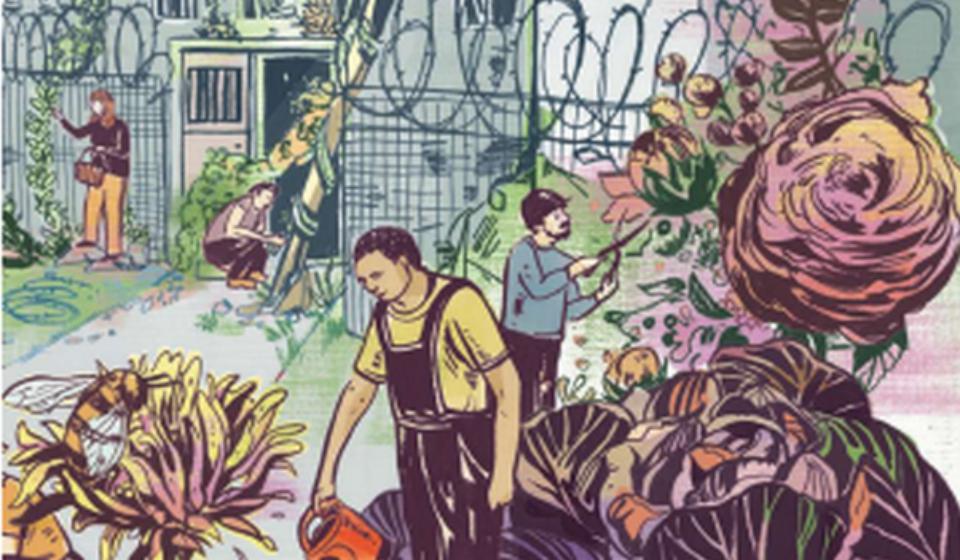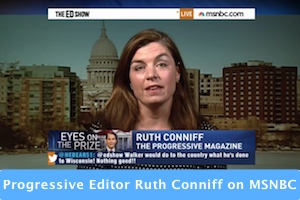“War costs us everything and resolves nothing.”

Illustration by Jacqui Oakley
When John Turner left Walker State Prison in Georgia in early August, his wife gave him a new set of clothes. He put them on and looked at himself in the mirror. “This is me for the rest of my life,” he thought, vowing never to return to wearing prison stripes.
When we talk three days after his release, Turner is thrilled about his newfound freedom. He likens it to “going into a different world.” Cellphones amaze him: “Everyone’s on them, everywhere you go.” He’s still getting used to sleeping with the lights off. During dinner at a restaurant, he wanted to sit in a corner so his back was not to anybody.
Turner, thirty-eight, is a beneficiary of prison reforms that came about under Georgia’s Republican Governor Nathan Deal, who took office in 2011. Deal opened accountability courts for veterans and offenders with mental health and substance abuse problems, built prison education programming, invited in religious groups, and decentralized the state’s juvenile justice facilities.
Deal’s second inaugural address contained a message for inmates: “If you pay your dues to society, if you take advantage of the opportunities to better yourself, if you discipline yourself so that you can regain your freedom and live by the rules of society, you will be given the chance to reclaim your life.” Turner, who recently got hired as a welder, has taken that message to heart.
In 2014, The Atlanta Journal-Constitution reported, “Substantially fewer African Americans are being locked up in Georgia, a remarkable and historic change in a state that has long packed its prisons with disproportionate numbers of black offenders.” Georgia’s reforms are among the most significant of a slew of recent criminal justice changes led by Republicans in the Deep South as well as Northern red states. These reforms have attracted publicity, in part because conservatives are driving, and campaigning on, them.
Many of the current Republican candidates for President have reformist criminal justice positions. A recent Brennan Center publication, Solutions: American Leaders Speak Out on Criminal Justice, contains essays from several of them. These include: “Save Jail for the Dangerous,” by Chris Christie; “Reduce Federal Crimes and Give Judges Flexibility,” by Ted Cruz; “Restore Fairness in Sentencing,” by Rand Paul; “A Step Toward Freedom: Reduce the Number of Crimes,” by Marco Rubio; and “Follow the Texas Model,” by Rick Perry.
Perry’s essay reads in part: “By the time I left office in 2015, Texas had expanded the number of specialty courts in the state from nine to more than 160. We reduced the number of parole revocations to prison by 39 percent. We saved $2 billion from our budget, not to mention the countless lives saved. We did all this while our crime rate dropped to its lowest point since 1968. And for the first time in modern Texas history, instead of building new prisons, we shut down three and closed six juvenile lock-ups.”
Marie Gottschalk, professor of political science at the University of Pennsylvania and author of Caught: The Prison State and the Lockdown of American Politics, disputes Perry’s rosy report in her book, arguing that the drop in Texas’s prison population is linked to the number of people scheduled for parole.
The politicians who have jumped on the prison-reform bandwagon have also drawn criticism for tinkering around the edges of significant change, and for confining many of their reforms to the “non, non, non” crimes—nonviolent, nonserious, and nonsexual. Such reforms don’t do enough to diminish our massive prison system, critics say.
But Turner’s crimes were not “non, non, nons.” He served two full, concurrent fifteen-year sentences for kidnapping and armed robbery. Turner pushes himself to tell his story, sometimes pausing to say how difficult it is to admit what he did. A crack addict who left school at fifteen, Turner kidnapped a woman at gunpoint, took her money, then forced her to drive him to buy drugs, which he consumed in her car. A police officer stopped the car and arrested Turner when he fled. He was in his early twenties. Turner wishes he could ask the woman’s forgiveness, though by law he cannot contact her. But he’s done other things to set a positive course for his future.
He earned a welding certificate in prison, declaring in his graduation speech that the skills he acquired “will assist to me in my journey to reentry so that I can be a father, a husband to my wife, and a productive citizen in society.” He’s been sober for fifteen years and has completed several addiction courses. His girlfriend at the time of his arrest, who visited him every weekend during his fifteen years in prison, became his wife in 2006, during his sentence. While in prison, Turner witnessed shifts in corrections policy linked to Deal’s reforms. Programs were added, the food became healthier, prisoners got more support.
“I believe that Governor Deal has had a very positive impact on the prison system,” says Turner. “Since he’s been in office, there have been more changes that move the prison system in the right direction.” He thinks politicians before Deal were afraid of such moves. Back then, “you didn’t want to be light on crime.”
L.C. “Buster” Evans, an assistant commissioner in the Georgia Department of Corrections, supervises many of the programs Turner credits with helping inmates, including chaplaincy, risk reduction, health services for physical and mental health, and education and reentry programs. Georgia Corrections now performs a “risk-needs assessment” to identify inmates in need of substance abuse counseling, high school courses, and mental health treatment, and tries to link prisoners with programs.
This is an about-face for Georgia, for decades a tough-on-crime state. By 2010, according to The Atlanta Journal-Constitution, Georgia operated “the fifth-largest prison system in the nation, at a cost of $1 billion a year.” During the prior decade, its inmate population “jumped by more than a quarter.” Evans recalls that, shortly before he came on board, the corrections system cut the number of prison teachers—who were few to begin with. Turner remembers cuts to the chaplain position and exercise programs, which have been restored under Deal. And the prison population has stabilized, according to a February report of the Georgia Council on Criminal Justice Reform.
Evans, a former school superintendent, cites a 2013 meta-analysis of correctional programs, by the Rand Corporation, which showed that every dollar invested in correctional education brought $4 to $5 savings to the state. The study indicates inmates with access to correctional education have an easier time getting jobs and “on average, inmates who participated in correctional educational programs had 43 percent lower odds of recidivating than inmates who did not.” And educational programming, Evans says, helps make inmates more manageable. They are not as bored, “and their lives have more meaning now.” Evans beefed up the prison library system to encourage inmates to read, and partnered with a charter school to offer a high school degree. “Up until that point,” he says, “you could get a GED in prison in Georgia, but could not get a high school degree—not in adult prison.”
Seventy percent of inmates in Georgia lack a high school diploma. The prison system reading level averages about eighth grade, Evans says. When we speak in early July, he tells me that in two weeks, “we will graduate our first fifteen high school graduates.”
The Georgia Department of Corrections also developed vocational training programs to prepare inmates for higher-wage jobs. These include the welding program that gave John Turner a certificate, as well as a program that prepares inmates to become professional truck drivers. And Evans says many of the thirty-five welding students who graduated in June “are sitting on job offers once they get out of prison.” There are plans to launch two more welding programs, one for female inmates. Expanding the availability of prison programming with limited space and resources is a constant challenge, but one that Evans feels is being met.
“Our people are more energized realizing they have the support of their governor. It’s a new day.”
— L.C. “Buster” Evans, Georgia Department of Corrections
The movement for modest prison reform is taking place against a background of extreme need. The United States, with 5 percent of the world population, holds 25 percent of the world’s prisoners. Its prison population has risen 700 percent since 1970. Today, one in thirty-one adults is under correctional control.
And, of course, the rates are disproportionate for minorities, especially under-educated black men. The Pew Research Center has reported that the institutionalization rate for this group rose from 10 percent in 1980 for those ages twenty to twenty-four to 30 percent in 2000. Even in 2010, the Pew study found, members of this group “were more likely to be institutionalized than they were to be employed.”
Now some conservatives are pushing back against the prison system’s extravagant size and cost, especially at the state level. There is even a model bill curbing mandatory minimum sentencing designed by the American Legislative Exchange Council (ALEC), the national group that brings together large corporations and Republican state legislators to draft legislation.
Greg Newburn, state policy director of Families Against Mandatory Minimums, a nonprofit group devoted to sentencing reform, rattles off states that are, in his view, making progress, due in part to the efforts of conservative politicians. They include Oklahoma, South Carolina, Utah, and Pennsylvania. Across the country, Newburn says, politicians are “definitely testing the waters on criminal justice reform.” He notes that “the fear of being soft on crime is just not as pervasive.” And there is growing public support for using tax dollars to make corrections more effective, as opposed to just locking people up. “It’s really exciting, actually.” Newburn believes Republican prison reformers are essentially in agreement with reformers on the left. “I don’t think there’s any difference in what they’re trying to do,” he says. “That principle runs across the political spectrum: Can we do things better than the status quo? Both sides have come to the conclusion that we can.”
Derek Cohen, senior policy analyst with Right on Crime, part of the Center for Effective Justice at the Texas Public Policy Foundation, thinks states are leading the way on prison reform because state legislators “don’t have the level of stalemate” that characterizes the federal government. And most of the nation’s prisoners are housed in state prisons. The Right on Crime initiative has attracted numerous high-profile Republican signatories, including Newt Gingrich and Grover Norquist. In April, Norquist teared up while talking to Wisconsin lawmakers about the human cost of mass incarceration on “families, lives, and neighborhoods.” The movement traces its beginnings to Chuck Colson, the former special counsel to President Richard Nixon who went to prison on Watergate-related charges. Colson founded a group called Prison Fellowship, which, Cohen says, “people just came around to.”
Craig DeRoche, executive director of the affiliated Justice Fellowship, is a recovering addict with past arrests; one of his colleagues served a prison sentence for bank robbery. “We’re practitioners as well as theorists,” DeRoche reflects. “We believe that people with criminal records, people who’ve been incarcerated, are the best people, not the worst, to help solve the problems facing America.”
Republicans justify criminal justice reform from different perspectives. Fiscal conservatives focus on saving money; religious conservatives on saving souls. Vikrant Reddy, who worked for Right on Crime and is now a senior fellow at the Charles Koch Institute, which backs prison reform, says social conservatives have turned to criminal justice because they noticed the effect of the system on families. In some communities, Reddy says, “families are just ravaged” because so many parents are in prison. And children of incarcerated persons are less likely to graduate from high school and more likely to go to prison themselves.
And then there are the libertarians, who Reddy says have always been interested in prison reform. They’re “unnerved” by the vastness of the nation’s prison system, with huge numbers of people “locked up in cages.” The idea that organizations such as ALEC and the Charles Koch Institute are advocating criminal justice reform may strike many as an oddity. Before 2009, ALEC was “a leading force for decades in pushing prison construction, privatization of the penal system, and punitive measures like ‘truth in sentencing’ and ‘three-strikes-and-you’re-out’ statutes,” writes Gottschalk. Charles Koch, whose father helped found the rightwing John Birch Society, and who was himself a member even after his father’s death, has waged a decades-long campaign, along with his brother David, to fight civil rights laws, and the legacy of the New Deal.
But during the last decade, The Daily Beast reported, “The Kochs have poured seven figures in donations toward criminal justice reform, mainly through the National Association of Criminal Defense Lawyers.” As for Charles Koch, “This has always been an issue he’s been very passionate about,” Reddy says. “It’s something he’s cared about personally. It’s always been very clear to everyone on the right that Charles Koch has this one very high on his personal list.”
Whatever motivates conservative politicians, DeRoche says, it has not come at a political cost. He notes that Georgia’s Governor Deal, facing a tough battle for reelection in 2014, was able to run “on a criminal-justice reform message that he had reduced African American incarceration by 20 percent.” He ended up doing slightly better than other white Republicans among black voters. Says DeRoche, “He may not have been elected, but for that.” And in Ohio, Governor John Kasich credited his own reelection in 2014 to his reform agenda. The Republican Kasich, reported the Associated Press, “told supporters at a downtown victory rally that voters backed his campaign because Ohio’s Republican Party has made efforts to help many groups, including those who are mentally ill, drug-addicted and poor.”
Pat Nolan, the former executive director of Prison Fellowship, is now director of the American Conservative Union Foundation’s Center for Criminal Justice Reform. The subject of a recent profile in The New Yorker, he sees the new conservative prison reform as shifting the landscape.
“What the conservatives have done is free up not only conservatives to vote for it but also liberals to vote for it, because they don’t have to be afraid of being attacked,” Nolan says. “That’s been our object—to frankly be equal partners in this.” He notes that there are still divisions. Some Republicans, he concedes, “believe we don’t lock up enough people.” And he sees some progressives as too dismissive of concerns about public safety, when prisoners are released back into communities.
Some critics of the prison reform movement warn of a brewing backlash. Nolan shares their concern, especially if crime rises or if “somebody who’s gotten a shorter sentence thanks to our policy does something awful.” Nolan says his coalition works against such a prospect “by having more programs that keep people on the straight and narrow.”
Jessica Jackson Sloan, the national director of the #cut50 initiative, which aims to halve prison populations in the United States over the next ten years, takes a measured view of the role of conservatives in turning back the tide of mass incarceration. “It’s important we take the bipartisan movement right now and utilize it to bring reform,” she says. “This is a new issue for conservatives to be leading on. And they are.” But, Jackson Sloan says, “there are decades and decades of mistrust among progressives and conservatives, and for good reason.” So when conservatives start adopting prison reform as an issue, “everybody scratches their heads.”
Progressives worry, for instance, about ALEC and its allies’ push to privatize prisons, which her group opposes. But among the conservative prison reform advocates she works with, she says, “nobody has brought that up.” Gottschalk, in her new book, cautions against overstating the impact of conservative-led reforms. She notes that the nation’s total inmate population “fell by just 2.5 percent, or 56,500 people” from 2009 to 2012, with 75 percent of that drop in California as the result of a Supreme Court decision. The number of inmates has continued to grow in about half the states.
“For all the talk about the dawning of a new age in penal reform with the emergence of the justice reinvestment and Right on Crime movements, the actual impact of these initiatives on the reach of the carceral state has been remarkably modest,” Gottschalk writes. She also warns of a “sadly historical pattern” in which prison reform optimism is overcome by a push in the opposite direction.
But David Dagan, a journalist and Ph.D. candidate in political science at Johns Hopkins, notes that many of the red states that have embraced reforms have followed small steps with bigger ones. He holds up Mississippi and Georgia as examples. Georgia, he points out, has done something each year for four years. It’s “a vote for the optimist camp,” he says. If Dagan’s an optimist, he’s a cautious one. “I don’t think everything is going to be fine and we’re going to end mass incarceration in a decade,” he says. “But I think, on balance, the momentum is clearly with the reformers. Right now, they’re in a pretty good position to make some changes.
Section:
Topics:
More
- Subscribe
- Featured Video
- Recent Stories
- Recent Comments
- Poetry


California professor Julian Vasquez Helig says social media can help in the fight to save education.
By Wendell Berry
Manifesto: The Mad Farmer Liberation Front
Love the quick profit, the annual raise, vacation with pay. Want more of everything ready made. Be afraid to know your neighbors and to die. And you will have a window in your head. Not even your future will be a mystery any more. Your mind will be punched in a card and shut away in a little drawer. When they want you to buy something they will call you. When they want you to die for profit they will let you know. So, friends, every day do something that won’t compute. Love the Lord. Love the world. Work for nothing. Take all that you have and be poor. Love someone who does not deserve it. Denounce the government and embrace the flag. Hope to live in that free republic for which it stands. Give your approval to all you cannot understand. Praise ignorance, for what man has not encountered he has not destroyed. Ask the questions that have no answers. Invest in the millennium. Plant sequoias. Say that your main crop is the forest that you did not plant, that you will not live to harvest. Say that the leaves are harvested when they have rotted into the mold. Call that profit. Prophesy such returns. Put your faith in the two inches of humus that will build under the trees every thousand years. Listen to carrion—put your ear close, and hear the faint chattering of the songs that are to come. Expect the end of the world. Laugh. Laughter is immeasurable. Be joyful though you have considered all the facts. So long as women do not go cheap for power, please women more than men. Ask yourself: Will this satisfy a woman satisfied to bear a child? Will this disturb the sleep of a woman near to giving birth? Go with your love to the fields. Lie easy in the shade. Rest your head in her lap. Swear allegiance to what is nighest your thoughts. As soon as the generals and the politicos can predict the motions of your mind, lose it. Leave it as a sign to mark the false trail, the way you didn’t go. Be like the fox who makes more tracks than necessary, some in the wrong direction. Practice resurrection.
Wendell Berry is a poet, farmer, and environmentalist in Kentucky. This poem, first published in 1973, is reprinted by permission of the author and appears in his “New Collected Poems” (Counterpoint).




















Add new comment